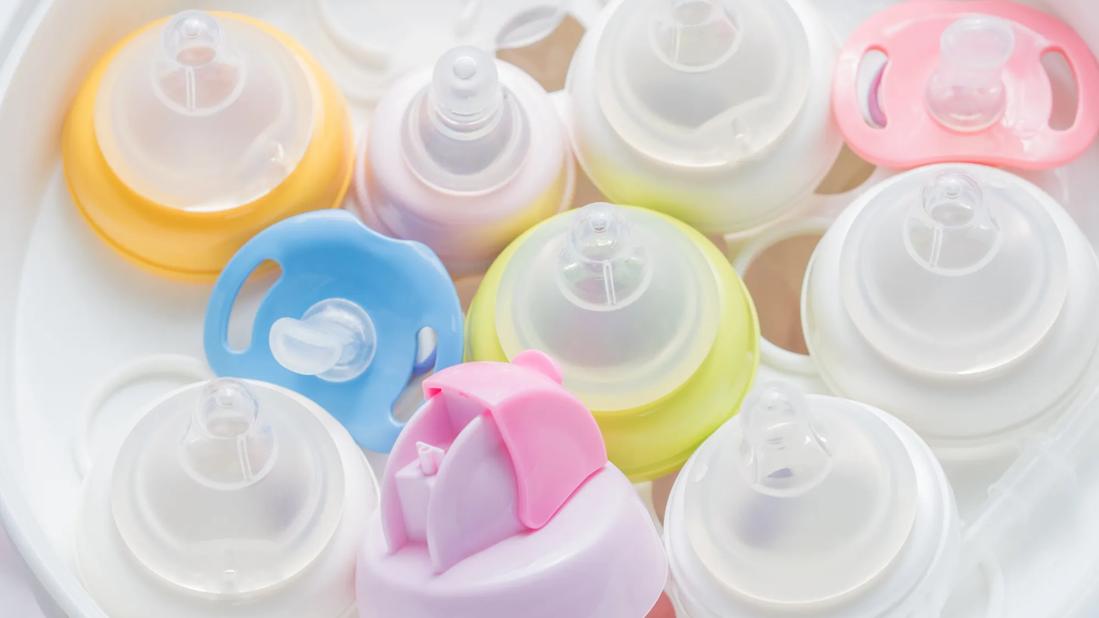A quick wash with soap and hot water can keep the germs at bay

Pacifiers can be a blessing when your baby needs to activate their sucking instinct and calm their cries. And they can be a curse ... cue that middle-of-the-night search.
Advertisement
Cleveland Clinic is a non-profit academic medical center. Advertising on our site helps support our mission. We do not endorse non-Cleveland Clinic products or services. Policy
But then, there’s the question of how to clean the thing, especially if your baby seems to spend as much time chucking it as sucking it.
What’s the right way to clean and sanitize a pacifier? Pediatrician Jason Sherman, DO, shares tips for keeping pacifiers clean — and babies healthy.
A pacifier that hits the floor — or a tabletop, car seat or any other less-than-pristine surface — should be cleaned.
Any time a binky hits a surface, it can pick up germs, including viruses or bacteria that can make your little one sick. (And before you ask ... no, the five-second rule doesn’t apply here). Dirty pacifiers can also spread thrush, a common fungal infection that causes white patches and uncomfortable sores in your baby’s mouth.
And babies hardly need help getting more germs in their systems.
“You don’t have to keep them in a bubble,” Dr. Sherman says. “But you should do your best to keep them from getting sick, especially little babies who don’t yet have much of an immune system and haven’t had their vaccines.”
When in doubt, give the pacifier a quick wash, particularly if it looks dirty or fell on the ground, floor or another surface (think restaurant tables or wedged in the stroller). And don’t forget the crud that builds up in your baby bag or purse — if the pacifier’s been rattling around down there with the lint, gum wrappers and crumpled up receipts, a quick clean is in order.
Cleaning a pacifier doesn’t have to be complicated. But, no, a swipe on your shirt, a big blow or a quick lick (ewww) isn’t the answer.
Advertisement
A simple suds-up with hot water and dish soap is the best way to clean a pacifier, Dr. Sherman says.
Fill up your sink with some hot, soapy water and let the pacifier soak for a minute. Rinse it off and dry it well or let it air dry. And, voilà! Clean and ready to go.
Wondering about those pre-packaged pacifier wipes? They can be helpful in a pinch if you’re far from a sink. But they’re no better than good ol’ soap and water. As Dr. Sherman notes, “They aren’t necessary if you have the use of a sink or soap and water readily available.”
If you’re on the go, those wipes can be better than nothing. But better yet, pack extra pacifiers for your day out. And wash them all in the sink when you get home.
As for the age-old technique of popping your baby’s pacifier into your mouth to clean it? The spit-clean method may be your mother-in-law’s recommendation, but it’s not Dr. Sherman’s.
“You might feel healthy, but you never know if you’re carrying germs,” he warns. “Sucking on your baby’s pacifier could spread microorganisms that put the baby at risk.”
If you want to go the extra mile and sanitize or sterilize your baby’s pacifier, you can. Especially before a first use, it can help to sterilize a pacifier to remove any germs that found their way in during manufacturing and packaging.
There are a few different ways you can sterilize a pacifier, including:
As for how often to sanitize a pacifier, there are different schools of thought. If it helps you sleep better at night, sanitizing once a week or every two weeks can be OK. And it might be advised if your little one has a condition that affects their immune system.
But on the whole, Dr. Sherman recommends sterilization only for new pacifiers — especially if you keep up with washing them with soap and hot water. And know that frequent sterilization can damage the plastic and rubber. So, watch for signs of wear and toss out damaged pacifiers.
Concerned that baby’s pacifier isn’t as clean as it could be? Follow these tips:
Advertisement
What about when baby grabs the pacifier and pops it back in before you can clean it? No need to panic. Praise their new fine motor skills and move on.
“Odds are, a less-than sparkly clean pacifier won’t be a problem for most healthy babies,” Dr. Sherman says. “But whenever you can, give pacifiers a quick rinse with soap and water just to be safe.”
Advertisement
Learn more about our editorial process.
Advertisement

Most babies will crawl between 7 and 10 months old, but later can be normal, too

Adding extra formula, cereal or medications to your baby’s bottle is a dangerous and misguided practice

Teaching your baby to sign may help ease frustrations before they can talk, but it’s not a must-do

Babies can get congested easily, but you can calm their cough by keeping them hydrated, using nasal drops and running a humidifier

Try to burp your baby mid-feed and after they finish eating — but don’t sweat it if they don’t burp

Most babies will recognize their name by about 9 months old

Clean your baby’s mouth with a washcloth or small toothbrush if they have a tooth or you suspect thrush

‘Social smiles’ typically start around 8 weeks old, while laughter comes later — around 4 to 6 months

The tropical fruit is a good source of antioxidants and vitamin C

Most people fall asleep within 10 to 20 minutes, but if your experience is different, adjusting your sleep schedule may help

Exploring your hidden side can lead to better understanding of what makes you tick